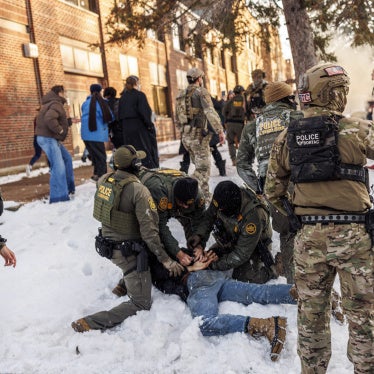Dear Minister Payne,
We write to urge the Australian government to take all feasible measures to ensure the protection of civilians and civilian objects during military operations undertaken by the Australian government in Iraq and Syria. This includes maintaining international standards and procedures designed to prevent civilian casualties, robustly and transparently reporting the occurrence of airstrikes and enemy and civilian casualties; promptly, impartially, and thoroughly investigating instances where civilian casualties may have occurred as a result of those operations; and providing compensation for wrongful civilian deaths and injuries and appropriate “condolence” or ex gratia payments for civilian harm. We are especially concerned by recent news reports citing a recently released Freedom of Information Act request that Australia does not disclose, and may not even be collecting information on, civilian casualties in Iraq and Syria.
The protection of civilians in Iraq and Syria is paramount, especially as civilians have become trapped between the forces of the Islamic State (also known as ISIS) and advancing forces tasked with defeating ISIS. Heavy fighting has exacerbated already dire conditions for hundreds of thousands of civilians in both Iraq and Syria.
While the humanitarian situation worsens, recent strikes by members of the US-led coalition, operating under the Combined Joint Task Force —Operation Inherent Resolve, have resulted in a sharp increase in the number of alleged civilian casualties in both Iraq and Syria. We are deeply concerned about recent changes in the manner in which the US-led coalition authorizes and conducts some of its airstrikes. Each country in the coalition maintains its own rules of engagement, and we understand that Australia is satisfied that its rules of engagement are designed to minimize the risk to civilians. Yet with the recent rise in civilian casualties, Human Rights Watch strongly urges the Australian government to take several steps to ensure that civilians and civilian objects are better protected.
Airstrike procedures
First, the Australian government should maintain measures to require the maximum levels of target verification and authorization prior to taking all strikes (air and ground-launched). A central decision-making node, such as a Combined Joint Forces Land Component Command-Operation Inherent Resolve’s “Strike Cell” in Baghdad, should evaluate and approve each strike and give additional targeting information and recommendations as necessary. Taking this step where practicable is one way to ensure targeting officers are equipped with a greater amount of information about the target and the potential risks to civilians prior to strike approval. Additionally, multi-level approval systems that incorporate and synthesize large amounts of information from the battlefield can help ensure that civilian casualties are minimized.
As a result of procedural changes reportedly made in December 2016, the United States removed the requirement that the “strike cell” in Baghdad approve certain strikes. The strike cell in Baghdad is officially a component of the Combined Joint Forces Land Component Command-Operation Inherent Resolve. The cell collects information and intelligence from coalition and Iraqi forces, evaluates proposed targets, and provides recommendations about whether to attack targets and with what weapons. It is comprised of several members of the Coalition; according to reporting by the US military, targeting officers from the Australian military are present in the Baghdad cell. The December rule change means that the United States is now carrying out some strikes without the benefit of the Baghdad strike cell’s information and targeting recommendations. Other coalition members should urge that the United States reinstate these prior procedures, or equivalent ones. This is particularly important given the high risk to civilians in the densely populated areas of western Mosul and for the hundreds of thousands of civilians in Raqqa.
When conducting airstrikes, the Australian government also should use all available means to verify the presence and location of combatants, as well as the presence of civilians in the immediate vicinity. Any estimates of potential civilian casualties made prior to a strike should take into account the fact that many civilians remain trapped in ISIS-held territory and may not be readily observable from the air or by the use of advanced targeting equipment. Because of this, surveillance, intelligence and reconnaissance assets under the control of the Australian government and members of the US-led coalition should, where possible, be dedicated to conducting pattern of life analyses and locating and tracking civilians moving in and out of potential and future target areas in advance of operations to reduce the risk of civilian casualties.
Prior to conducting strikes, the Australian government also should carefully and rigorously verify information received from partner forces, including other members of the US-led coalition, using all available assets (including aerial observations, information collected by personnel and military hardware, etc.). This step is critical to avoiding acting upon erroneous targeting information. Indeed, erroneous targeting information apparently contributed to the Australian government’s mistaken killing of dozens of Syrian soldiers on September 16, 2016 near Deir al-Zour, Syria. The Australian government should do everything feasible to avoid repeating such mistakes.
Transparency
Australia lacks transparency with respect to its public reporting on strikes in Iraq and Syria and investigations of strikes where civilian casualties allegedly occurred. Airwars, a UK-based nongovernmental organization that monitors airstrikes, said in a December 2016 report, Limited Accountability, that the Australian government is “one of the least transparent members of the international Coalition fighting the so-called Islamic State.”[1]
Beyond failing to publicly release information about the timing and location of its strikes, media reports[2] and a recently disclosed Freedom of Information Act response that the Australian government does not disclose (and may not even collect) data on civilian casualties in either Iraq are Syria are alarming. The fact that the coalition conducts preliminary investigations, collects and releases data regarding civilian casualties does not relieve the Australian government of the need to collect this information and make it available to the public. Without information regarding the timing and location of the strikes, it is also extremely difficult for independent monitors to rule out Australia’s participation in strikes where civilian casualties have allegedly occurred. We urge you to immediately release details on civilian casualties caused by Australian airstrikes, and if you are not collecting such information, to start doing so without delay.
The Australian government has stated that the reason for its lack of transparency is that it needs to protect operational security, citing the risk that ISIS could use such information as propaganda.[3] Protection of national security is a recognized limitation on the internationally recognized right to freedom of expression (which includes government responsibilities to provide information).[4] But this restriction must be narrowly tailored to prevent a specific threat, and be proportionate to the threat. Importantly, the government has an obligation to ensure that information of public interest is, wherever possible, available to the public, including through freedom of information requests, and to review internally held information periodically with a view towards making it publicly available. We believe information regarding Australian airstrikes and civilian casualties caused by such strikes is indeed in the public interest.
While there are legitimate security concerns with respect to disclosing information about military operations, other members of the US-led coalition, notably the United Kingdom, United States, Canada, and Denmark (who increased transparency as their campaign progressed), have demonstrated that they can provide this information without compromising national security.
The government is also obligated under international law to conduct thorough, prompt, and impartial investigations of alleged violations of international humanitarian law, appropriately discipline or prosecute those responsible, and providing adequate redress for victims of violations. The government should not rely on coalition casualty reports and preliminary investigations in lieu of collecting information about the people — both civilians and combatants — it has killed during its operations. The Department of Defence acknowledged in its response to a Freedom of Information Act request that Battle Damage Assessments (BDA), which it typically preforms immediately following a strike, only capture “assessed collateral damage” and normally do not capture casualties. If the government does not collect or seek information pertaining to casualties, its ability to conduct thorough investigations of its own airstrikes after the fact — specifically where new information arises — will likely be significantly degraded. This may also make it impossible for Australia to meet its obligations to thoroughly investigate any alleged wrongdoing or provide redress.
Accordingly, the Australian government should individually, robustly, and transparently investigate credible reports of all civilian casualties and make public detailed findings of all of its investigations. These investigations should include the use of a full range of tools, including interviews with victims and their families, consultation with human rights groups, surveillance and targeting videos, and forensic analyses. Reliance on video assessments taken only from the air often will not provide the full picture of casualties caused by a strike, especially in densely populated areas. The government should actively seek this information and not wait for it to be publicly reported before beginning an investigation. The public findings of investigations should include an explanation of what accountability measures it has taken, the redress provided to victims or their families, and the process through which accountability or redress it has determined to be necessary or not. Redress should include providing compensation for wrongful civilian deaths and injuries and appropriate compensation under the Tactical Payment Scheme for civilian harm. If the investigation finds that serious violations of the laws of war occurred, it should refer those responsible for appropriate criminal prosecution.
We strongly believe that at this critical juncture for the people of Iraq and Syria, the Australian government should be a model with respect to the measures it takes to ensure the protection of civilians, and make its operations more transparent.
We would be happy to meet you or your staff to discuss these issues further.
Sincerely,
Sarah Leah Witson
Executive Director, Middle East and North Africa Division
Human Rights Watch
Elaine Pearson
Australia Director, Asia Division
Human Rights Watch
CC:
Julie Bishop, Minister for Foreign Affairs
Dennis Richardson, Secretary, Department of Defence
Brendan Sargeant, Associate Secretary, Department of Defence
[1] Airwars, ‘Limited Accountability: A transparency audit of the Coalition air war against so-called Islamic State,’ December 2016 https://airwars.org/wp-content/uploads/2016/12/Airwars-report_Web-FINAL1.compressed.pdf (accessed May 1, 2017).
[2] See Sophie M’Neill, ‘Questions raised over Australian Defence Force's tracking of suspected civilian casualties from air strikes,’ ABC, March 15, 2017 http://www.abc.net.au/news/2017-03-14/adf-tracking-civilian-deaths-in-syria-iraq-is-airstrikes/8354064 (accessed May 1, 2017).
[3] Antony Loewenstein, ‘Australia against Isis: how much do we actually know?’ Guardian, August 6, 2015, https://www.theguardian.com/commentisfree/2015/aug/06/australia-against-isis-how-much-do-we-actually-know (accessed May 1, 2017); Airwars, ‘Limited Accountability: A transparency audit of the Coalition air war against so-called Islamic State,’ December 2016 https://airwars.org/wp-content/uploads/2016/12/Airwars-report_Web-FINAL1.compressed.pdf (accessed May 1, 2017).
[4] International Covenant on Civil and Political Rights (ICCPR) adopted December 16, 1966, G.A. Res. 2200A (XXI), 21 U.N. GAOR Supp. (No. 16) at 52, U.N. Doc A/6316 (1966), 999 U.N.T.S. 171, entered into force March 23, 1976, http://www.ohchr.org/EN/ProfessionalInterest/Pages/CCPR.aspx.







